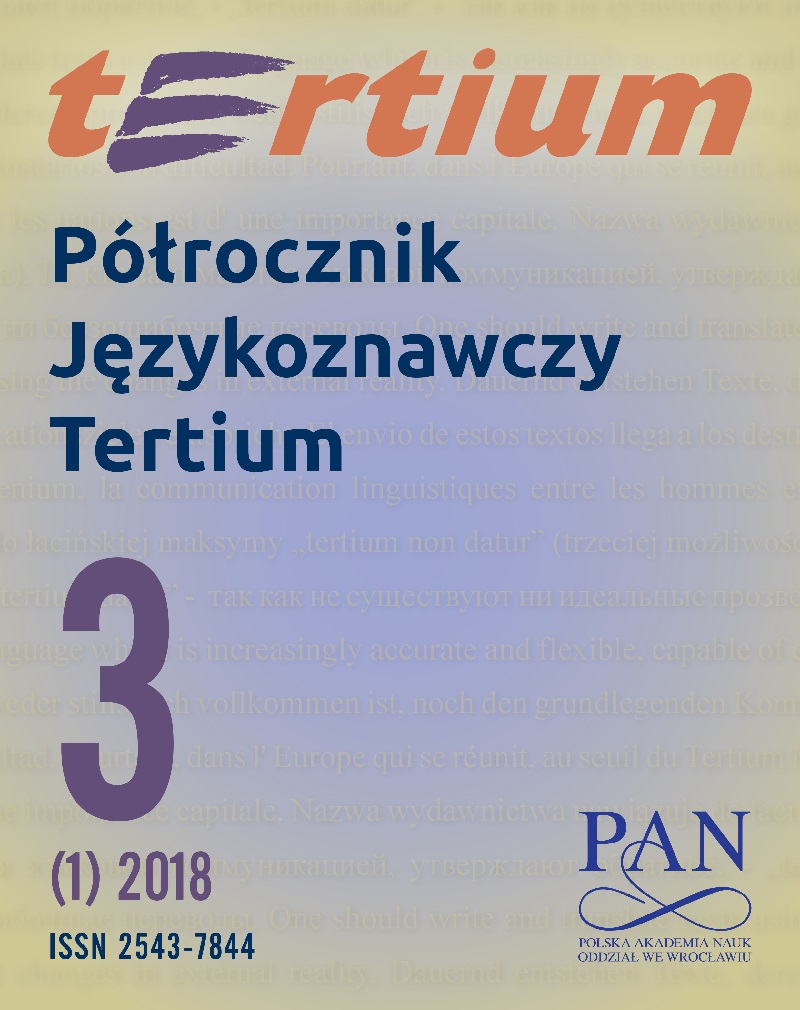O założeniach i postulatach lingwistyki kulturowej (na przykładzie definicji PRACY)
On the Assumptions and Claims of Cultural Linguistics. The Case of Polish PRACA ‘work’
Author(s): Jerzy BartmińskiSubject(s): Language and Literature Studies, Applied Linguistics, Communication studies, Sociolinguistics, Cultural Anthropology / Ethnology, Theory of Communication
Published by: Krakowskie Towarzystwo Popularyzowania Wiedzy o Komunikacji Językowej Tertium
Keywords: cultural linguistics; “Language and Culture” series; journal Etnolingwistyka; Lublin cognitive ethnolinguistics; linguistic worldview; cultural concept; PRACA/work
Summary/Abstract: Artykuł składa się z czterech części. W pierwszej autor przypomina początki formowania się lingwistyki kulturowej w Polsce, związane z wrocławskim programem badań nad polską kulturą narodową, utworzeniem konwersatorium „Język a Kultura” (też serii wydawniczej pod takim tytułem) i lubelskiego rocznika „Etnolingwistyka” w roku 1988. W drugiej podaje przykłady traktowania faktów językowych w perspektywie kulturowej, eksponując rolę słownictwa jako zwierciadła kultury. W trzeciej przedstawia 7-punktowe instrumentarium pojęciowe wypracowane w ramach lubelskiej etnolingwistyki kognitywnej (językowy obraz świata, stereotypy traktowane jako koncepty kulturowe, definicja kognitywna, punkt widzenia i perspektywa interpretacyjna; profilowanie bazowych wyobrażeń; wartości; podmiot doświadczający, konceptualizujący i werbalizujący). Na koniec na przykładzie jednego konceptu PRACA pokazane zostają efekty analizy z zastosowaniem przedstawionego tego instrumentarium pojęciowego. // The study consists of four parts. The first part is devoted to the beginnings of cultural linguistics in Poland, connected with the Wrocław-based programme for research on Polish national culture, the emergence of the “Language and Culture” research network (and a publication series with the same title), and the launch of the Lublin-based journal “Etnolingwistyka” in 1988. The second part contains examples of linguistic facts being viewed in cultural perspective, with a special role of the lexicon as the “mirror of culture”. Part three presents a repertoire of seven conceptual constructs proposed in Lublin cognitive ethnolinguistics (linguistic worldview, stereotypes as cultural concepts, cognitive definition, viewpoint and interpretive perspective, profiling of base images, values, and the experiencing, conceptualizing, and speaking subject). Finally, the fourth part illustrates the application of this theoretical framework in an analysis of the Polish cultural concept of PRACA ‘work’.
Journal: Półrocznik Językoznawczy Tertium
- Issue Year: 3/2018
- Issue No: 1
- Page Range: 26-55
- Page Count: 30
- Language: Polish

